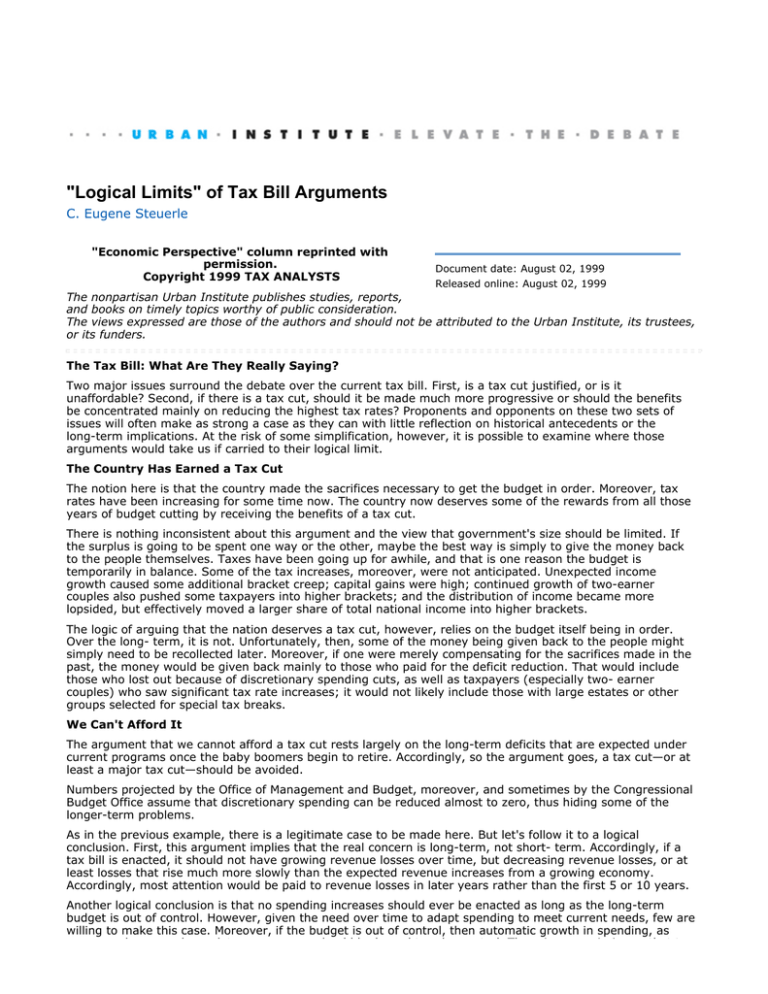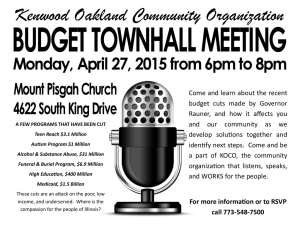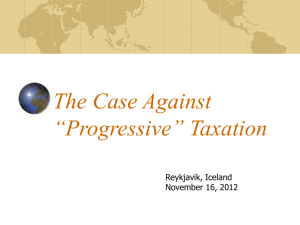"Logical Limits" of Tax Bill Arguments C. Eugene Steuerle
advertisement

"Logical Limits" of Tax Bill Arguments C. Eugene Steuerle "Economic Perspective" column reprinted with permission. Copyright 1999 TAX ANALYSTS Document date: August 02, 1999 Released online: August 02, 1999 The nonpartisan Urban Institute publishes studies, reports, and books on timely topics worthy of public consideration. The views expressed are those of the authors and should not be attributed to the Urban Institute, its trustees, or its funders. The Tax Bill: What Are They Really Saying? Two major issues surround the debate over the current tax bill. First, is a tax cut justified, or is it unaffordable? Second, if there is a tax cut, should it be made much more progressive or should the benefits be concentrated mainly on reducing the highest tax rates? Proponents and opponents on these two sets of issues will often make as strong a case as they can with little reflection on historical antecedents or the long-term implications. At the risk of some simplification, however, it is possible to examine where those arguments would take us if carried to their logical limit. The Country Has Earned a Tax Cut The notion here is that the country made the sacrifices necessary to get the budget in order. Moreover, tax rates have been increasing for some time now. The country now deserves some of the rewards from all those years of budget cutting by receiving the benefits of a tax cut. There is nothing inconsistent about this argument and the view that government's size should be limited. If the surplus is going to be spent one way or the other, maybe the best way is simply to give the money back to the people themselves. Taxes have been going up for awhile, and that is one reason the budget is temporarily in balance. Some of the tax increases, moreover, were not anticipated. Unexpected income growth caused some additional bracket creep; capital gains were high; continued growth of two-earner couples also pushed some taxpayers into higher brackets; and the distribution of income became more lopsided, but effectively moved a larger share of total national income into higher brackets. The logic of arguing that the nation deserves a tax cut, however, relies on the budget itself being in order. Over the long- term, it is not. Unfortunately, then, some of the money being given back to the people might simply need to be recollected later. Moreover, if one were merely compensating for the sacrifices made in the past, the money would be given back mainly to those who paid for the deficit reduction. That would include those who lost out because of discretionary spending cuts, as well as taxpayers (especially two- earner couples) who saw significant tax rate increases; it would not likely include those with large estates or other groups selected for special tax breaks. We Can't Afford It The argument that we cannot afford a tax cut rests largely on the long-term deficits that are expected under current programs once the baby boomers begin to retire. Accordingly, so the argument goes, a tax cut—or at least a major tax cut—should be avoided. Numbers projected by the Office of Management and Budget, moreover, and sometimes by the Congressional Budget Office assume that discretionary spending can be reduced almost to zero, thus hiding some of the longer-term problems. As in the previous example, there is a legitimate case to be made here. But let's follow it to a logical conclusion. First, this argument implies that the real concern is long-term, not short- term. Accordingly, if a tax bill is enacted, it should not have growing revenue losses over time, but decreasing revenue losses, or at least losses that rise much more slowly than the expected revenue increases from a growing economy. Accordingly, most attention would be paid to revenue losses in later years rather than the first 5 or 10 years. Another logical conclusion is that no spending increases should ever be enacted as long as the long-term budget is out of control. However, given the need over time to adapt spending to meet current needs, few are willing to make this case. Moreover, if the budget is out of control, then automatic growth in spending, as occurs under several mandatory programs, should be brought under control. There is no a priori case that tax occurs under several mandatory programs, should be brought under control. There is no a priori case that tax cuts are inferior automatically to spending increases, whether automatic or not. Tax Cuts Shouldn't Favor the Rich Since taxpayers with above-average income pay most of the taxes, it's easy for a tax bill to end up concentrating a significant amount of its benefits on them. Nonetheless, benefits can be focused on those with greater needs or low incomes. This fight over progressivity comes up whenever a tax cut is proposed. The issue is not whether or not there are valid arguments for a progressive tax system, but whether there are any acceptable limits to that progressivity. Suppose at one point in time we have a proportional tax increase to a progressive tax system: everyone's tax rate is increased by 10 percent. Then suppose that later, times become good and the government wants to return that money. Would a proportional tax cut that removed the previous increase then be unfair? Those who fight cuts that "give more to the rich" often mean that they want every bill—both tax increases and tax cuts—to add to net progressivity. Following this to its logical conclusion, over various tax cutting and tax increasing cycles, the rich would pay almost all taxes and those with moderate incomes would pay lower taxes, then zero taxes, then taxes that became more and more negative. Efficient Tax Cuts for the Rich Almost the opposite view is put forward by those who identify themselves most with what is sometimes called supply-side economics. They object most strenuously to such items as marriage penalty relief, child credits, and other so-called "family" provisions. They base their case on the economic theory that marginal tax rates—the rates applied to the last dollars earned—are more likely to affect decision-making. This case, just like the case for progressive taxation, does have some validity. People do pay more attention to the last dollars they earn or spend, whereas the first dollars—e.g., working or buying any food at all—are less responsive to tax rates. To focus tax cuts entirely on those tax rates that are most likely to be marginal, however, has a number of consequences. First, most or all cuts would be concentrated on the top brackets, that is, on the richest of taxpayers. Moreover, all tax increases would be assessed on taxpayers equally. Under this theory, a "head" tax—an equal tax on all people simply because they exist—would come close to being the most efficient of taxes because then a zero tax rate would be assessed on marginal efforts. Logical Limits Carrying each of these arguments to its logical conclusion exposes its limits. Tax cuts are a valid means of achieving smaller government, but they only work if expenditures somehow follow a similar path, especially in the long-term. By the same token, not all tax cuts are bad nor are all spending increases bad. As for progressivity, there are valid arguments to be made in favor of a progressive system, but not every change must add to overall progressivity. Neither can the supply-side argument for caring about only the top tax rates always hold up unless one really favors head taxes over all other forms of taxation. Other Publications by the Authors C. Eugene Steuerle Usage and reprints: Most publications may be downloaded free of charge from the web site and may be used and copies made for research, academic, policy or other non-commercial purposes. Proper attribution is required. Posting UI research papers on other websites is permitted subject to prior approval from the Urban Institute—contact publicaffairs@urban.org. If you are unable to access or print the PDF document please contact us or call the Publications Office at (202) 261-5687. Disclaimer: The nonpartisan Urban Institute publishes studies, reports, and books on timely topics worthy of public consideration. The views expressed are those of the authors and should not be attributed to the Urban Institute, its trustees, or its funders. Copyright of the written materials contained within the Urban Institute website is owned or controlled by the Urban Institute. Source: The Urban Institute, © 2012 | http://www.urban.org



